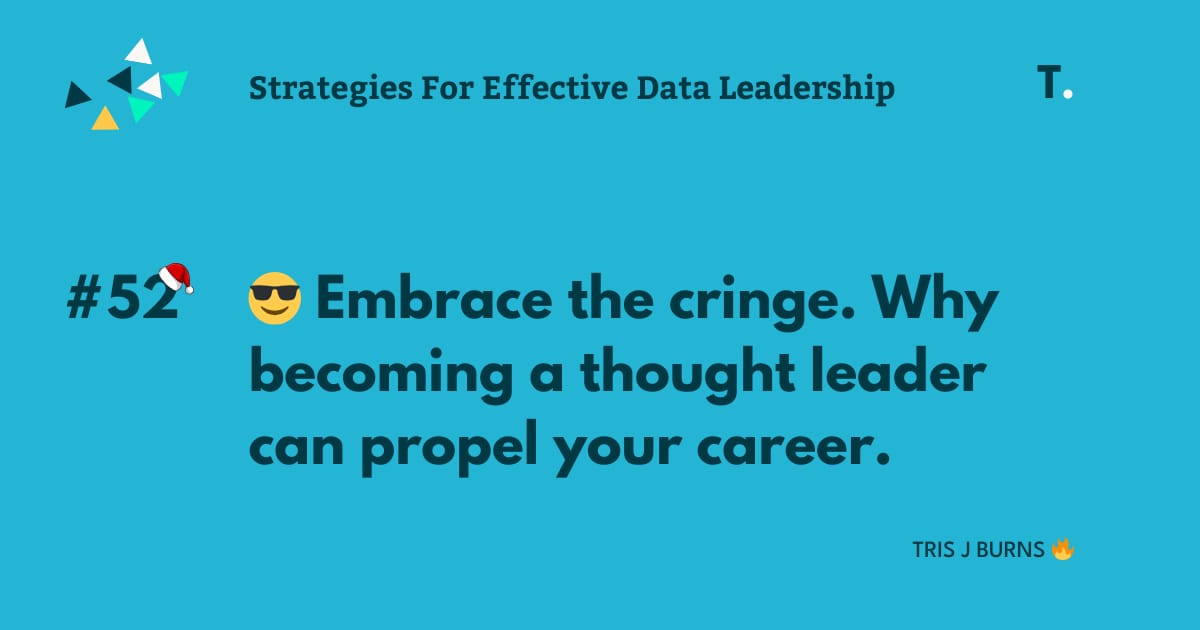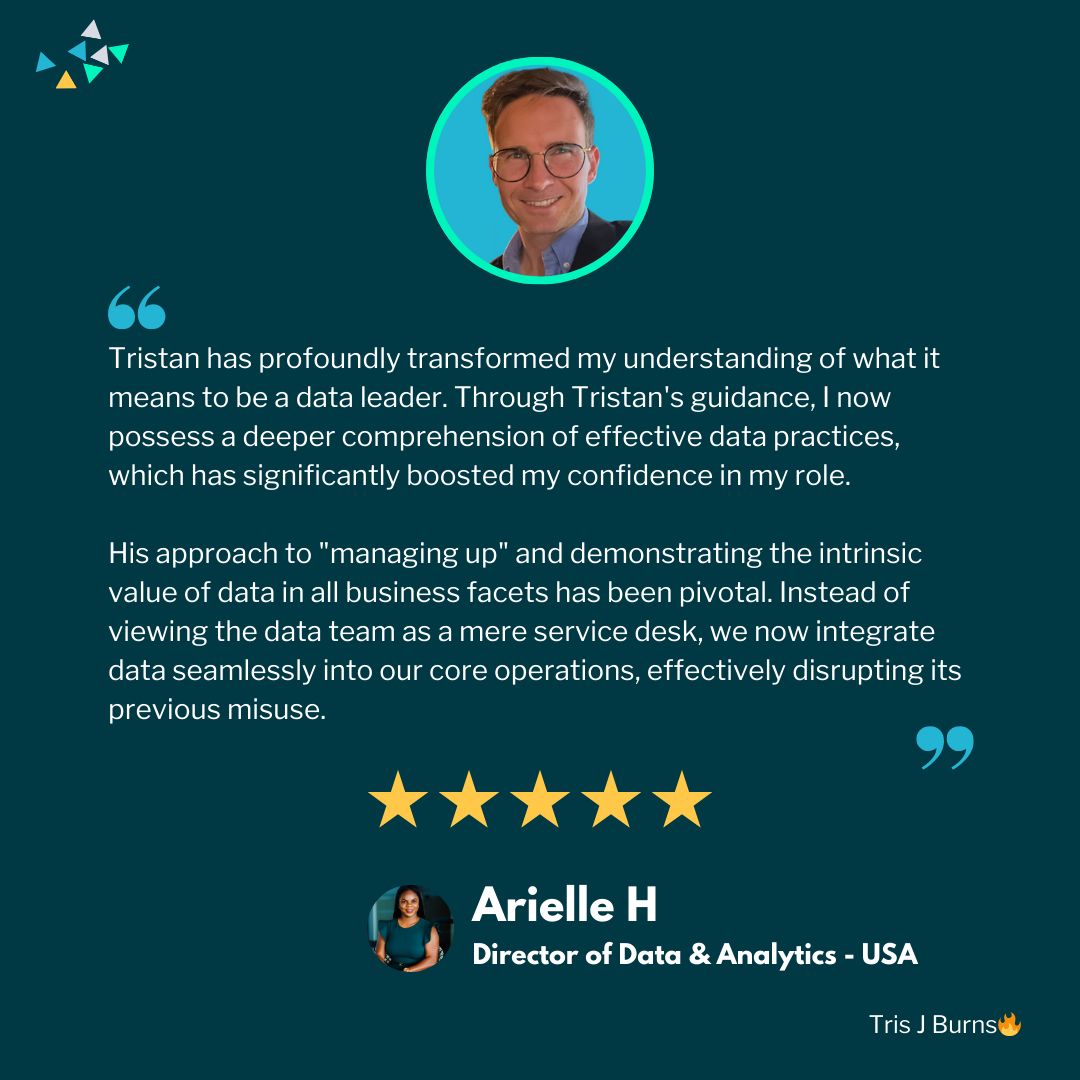
READ TIME: 5 MINUTES
😬 Thought leadership is super cringey right?
Increase productivity with the #1 ranked AI notetaker.
I use Fathom for calls with my 1:1 coaching clients (with permission, of course). The AI generated summaries you get from the calls are insanely good. It is easily the best AI note taking software I’ve ever used.
I can remain fully engaged with my client and not have to take notes, knowing full well that Fathom has my back.
What’s more, they don’t train their AI on your data!
I just love it. Check it out for free now!
Sure, it can be.
There are plenty of cringe-worthy takes on LinkedIn and elsewhere that come from so-called ‘Thought Leaders’ (here are some great examples).
It’s enough to put you off the whole idea of 'thought leadership’, isn’t it?
Don’t let it. 🙅🏽♀️
Whether you do it online or offline, updating your status to ‘industry thought leader’ can add powerful and far reaching benefits for your career in data leadership.
Done effectively, it can open doors you never realised you were shut out of.
Taking the knowledge and experience you already posses and turning that into easily digested written, spoken or video content, that you share with your professional community, can have tremendously positive impacts on your career, and take it in amazing new directions you have not even thought of.
Is becoming a thought leader in data your calling?
(Remember to check out last week’s SHOCKING poll results down below👇🏻)
📣 Don’t keep it to yourself…
The degree to which you embrace thought leadership is entirely up to you, but the limitations of not throwing your hat in the ring are as follows:
🫥 You Stay in the background
When you share your ideas with the world you attain a certain amount of recognition. But the opposite is true when you keep them to yourself.🤝 It’s harder to get stakeholder buy-In
Speaking up and sharing ideas via thought leadership has the power to morph you into an authority on the topic at hand. No matter how great your ideas might be, if you keep them to yourself you won’t acquire this authority. Which makes influencing stakeholders that much more challenging.😓 You’ll be networking on HARD MODE
It’s simple: Leaders with influence attract connections. If you’re invisible, you might miss out on establishing game changing relationships.🪑 No seat at the big kid’s table
Leaders speak up. Strategic opportunities go to those who are seen as leaders, not just doers.💥 You career might careen
The higher you climb, the more personal brand matters. You’ll be competing with others who will have invested more in their own personal brands. You’re at an automatic disadvantage and they’ve not even scheduled interviews yet.
Becoming a thought leader isn’t about being the loudest voice in the room, it’s about being the one people trust to have the right voice at the right time.
Another misconception is that it is only about fame and recognition.
This is certainly going to be true for some, but I also think it is about contributing to community. Keeping your hard earned insights and experience to yourself won’t support learning and growth in your community so why keep it locked up?
It all come down to what kind of though leader you want to be!

💭 Thinking out loud
How you embrace thought leadership and the ways in which you share ideas can be as unique as the ideas themselves. Not everyone needs to post on LinkedIn or X for example. You could potentially avoid social media altogether and still gain industry recognition as a thought leader.
Let’s take a look at how you might get started:
🏡 Own your space
Thought leadership starts at home base: your organisation. Host workshops, run experiments, and make your voice the one people trust on data. If you can’t share your brilliant ideas with the people you immediately work with, you’re going to struggle doing so more broadly.🛣️ Pick a lane
Are you the visionary who sees the big picture? The liaison who bridges the gap between data and business? Lean into your strengths and let them guide you. There is no point trying to speak about topics you’re either not close to, or not passionate about. So start with ones you are.👁️ Share with purpose
Whatever platform you land on, think of it as your stage. Share wins, insights, or even lessons learned the hard way. The key will be to stay consistent so pick an approach you can maintain over time and fits in with your other obligations.💡Say yes to the spotlight
Start small: an internal presentation here, a panel discussion there. Every “yes” is a step closer to being seen as an industry expert. Long before I was posting on LinkedIn, I was volunteering for talks (here’s my first ever talk from 2019).🎯 Stay strategic
Thought leadership isn’t a hobby, it’s an investment. Be intentional about what you post, where you speak, and the conversations you join. Keep an eye on the outcomes you want to achieve and use thought leadership to drive you ever closer to them.
“How can I start sharing my knowledge and experience with my network?” is among the top questions I get from my data leadership coaching clients. The advice I give to them, is the exact same advice that I’ve shared above.
Start small, start with what you know, and go from there. If you have ideas and experience, then it is valuable to someone. So don’t keep it to yourself!
📧 If you have any question or anything you’d like to add, don’t be shy! Hit reply - I’d love to hear from you!
💹 Price rise imminent
On Jan 1st, I’ll be increasing the price of my 1:1 Data Leadership Coaching by 12.5%
If you’re curious or you’ve been thinking about working with me, make sure you book in your free 1:1 intro call right now. Availability for the remainder of the year is limited.
Anyone who signs up during Dec will avoid the price rise - even if we don’t start until the new year!
To book in your free 1:1 intro session click here - availability limited!
⚡️ Last week’s poll results
Last week, we looked at ways to deal with stakeholders who were either non-supportive or even outrightly hostile towards data and data teams.
My question to you was: Have you worked with/for a data phobic-exec?
Results are shocking … but not surprising either. Over ¾ of you said that you had worked with data phobic stakeholder. Very sad to see.


Tristan Burns
💡 Helpful resources for data professionals:
The Data Leadership Frameworks: This email series containing 10 data leadership frameworks, will equip you with the necessary skills and knowledge to maximise your effectiveness and become the influential and powerful data leader you know you can be.
DIY Coaching Program: Through a series of 9 self-guided exercises, you’ll clarify your goals, overcome obstacles, and create a plan for your next career move - all at your own pace.
⚡️Three more ways I can help you:
Private Coaching for Data Leaders: I work with data professionals looking to grow into influential and unstoppable data leaders to help them navigate and overcome the challenges of being a data leader.
Group coaching for Data Teams: Great data teams can make or break businesses. Through my facilitated 6-week group coaching program, together we get to the heart of what is holding teams back and set a course for data-driven success.
Google Analytics, Tagging and Looker Support: Helping teams to set up or optimising their data eco system, generate actionable insights and gain more in-depth knowledge through training.
What did you think of this email?
If you enjoyed this newsletter, why not forward it to a friend.
Did someone forward you this email? You can subscribe to Strategies for Effective Data Leaders here!


